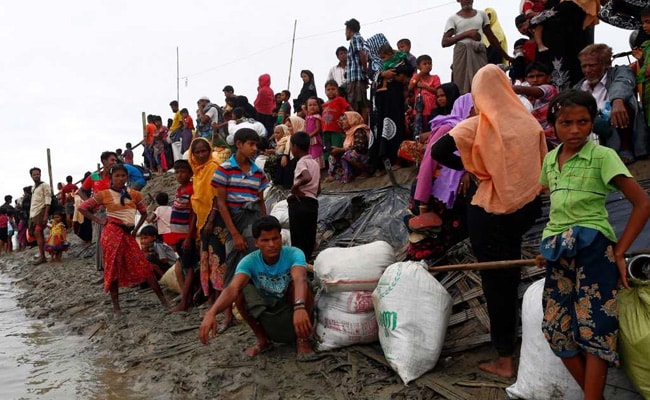
Nearly 40,000 Rohingya Muslims are scattered in cities like Jammu and Delhi.
New Delhi:
India is using "chilli and stun grenades" to stop Rohingya Muslims from crossing the highly porous border with Bangladesh into north eastern states like Mizoram, news agency Reuters reported today.
Rohingya Muslims are fleeing from violence in their homeland of Myanmar, but the centre has said that the nearly 40,000 who are scattered in cities like Jammu and Delhi are illegal immigrants who must be deported in part because of security risks.
"We don't want to cause any serious injury or arrest them, but we won't tolerate Rohingya on Indian soil," said a senior official with the Border Security Force (BSF) in Delhi to Reuters.
"We're using grenades containing chilli spray to stop hundreds of Rohingyas trying to enter India ... the situation is tense," added the official; Reuters said he declined to be identified as he is not authorised to speak to media.
The centre has told the Supreme Court that it will share confidential information to prove that Rohingya Muslims have links to Pakistan-based terror groups. But Rohingya petitioners who have asked the Supreme Court to block the centre from deporting them said today that many of them have "no link to any criminal activity, leave alone terrorist activity."
 More than 420,000 Rohingya have fled to Bangladesh since late in August when a coordinated attack by Rohingya insurgents on Myanmar security forces triggered a counteroffensive, killing at least 400 people, mainly militants. The United Nations has called the assault a "textbook example of ethnic cleansing".
More than 420,000 Rohingya have fled to Bangladesh since late in August when a coordinated attack by Rohingya insurgents on Myanmar security forces triggered a counteroffensive, killing at least 400 people, mainly militants. The United Nations has called the assault a "textbook example of ethnic cleansing".
Densely populated Bangladesh is struggling to shelter all the refugees desperate for space to set up shacks, sparking worries in India that the influx could spill into its territory.
RPS Jaswal, a deputy inspector general of the BSF patrolling a large part of the border in West Bengal, said his troops were told to use both chilli grenades and stun grenades to push back the Rohingya.
A chilli grenade makes use of a naturally-occurring compound in chilli powder to cause severe irritation and temporarily immobilise its target.
Police have recently arrested a suspected al-Qaeda member they believe was trying to recruit Rohingya in the country to fight security forces in Myanmar.
"Our investigations have revealed that al-Qaeda wants to use India and Bangladesh as their base to start a religious war against Myanmar," said Delhi police official Pramod Singh Khuswah. "Clearly they are a threat to our security."
Rohingya Muslims are fleeing from violence in their homeland of Myanmar, but the centre has said that the nearly 40,000 who are scattered in cities like Jammu and Delhi are illegal immigrants who must be deported in part because of security risks.
"We don't want to cause any serious injury or arrest them, but we won't tolerate Rohingya on Indian soil," said a senior official with the Border Security Force (BSF) in Delhi to Reuters.
"We're using grenades containing chilli spray to stop hundreds of Rohingyas trying to enter India ... the situation is tense," added the official; Reuters said he declined to be identified as he is not authorised to speak to media.
The centre has told the Supreme Court that it will share confidential information to prove that Rohingya Muslims have links to Pakistan-based terror groups. But Rohingya petitioners who have asked the Supreme Court to block the centre from deporting them said today that many of them have "no link to any criminal activity, leave alone terrorist activity."

Rohingya are denied citizenship in Buddhist-majority Myanmar and regarded as illegal immigrants (File)
Densely populated Bangladesh is struggling to shelter all the refugees desperate for space to set up shacks, sparking worries in India that the influx could spill into its territory.
RPS Jaswal, a deputy inspector general of the BSF patrolling a large part of the border in West Bengal, said his troops were told to use both chilli grenades and stun grenades to push back the Rohingya.
A chilli grenade makes use of a naturally-occurring compound in chilli powder to cause severe irritation and temporarily immobilise its target.
Police have recently arrested a suspected al-Qaeda member they believe was trying to recruit Rohingya in the country to fight security forces in Myanmar.
"Our investigations have revealed that al-Qaeda wants to use India and Bangladesh as their base to start a religious war against Myanmar," said Delhi police official Pramod Singh Khuswah. "Clearly they are a threat to our security."
Track Latest News Live on NDTV.com and get news updates from India and around the world

